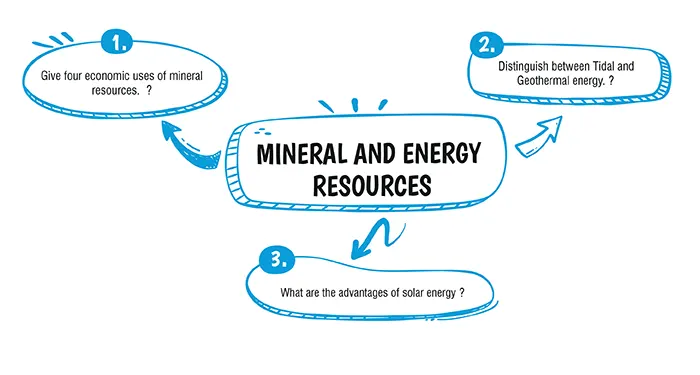Table of Contents

Ans. (d) Coal
Explanation:
A mineral from which we get metals is known as Metallic Mineral. Examples: Iron, copper, aluminium, gold, lead, tin etc. Coal is a non-metallic mineral
Ans. (b) Natural Gas
Explanation:
Natural gas is the clean energy resource which is found in association with petroleum.
Explanation:
Mineral resources are useful in four ways :
1. They form the basis for industries.
2. Means of communication depend upon them.
3. They are the source of energy, e.g., coal and petroleum.
4. One can earn foreign exchange by exports of mineral resources.
Explanation:
| Tidal Energy | Geothermal Energy |
|---|---|
| (i) It is generated from periodic rise and fall of water of ocean or sea. | It is dervied from the heat present in the earth's interior. |
| (ii) The energy density of tidal energy higher than other sources. | It is relatively constant sources of energy. |
Explanation:
(i) Solar energy is a clean and renewable energy source.
(ii) There is no carbon dioxide, methane or any other emission in the case of solar energy.
(iii) It works whenever the sun shines.
(iv) Solar powered panels and products are extremely easy to install.
(v) Solar cells provide cost effective solutions to energy problems in places where there is no means of electricity.
Download Mind Map of this chapter
Download NowWant to Practice Mock Tests of this chapter
Practice NowDownload Important Questions of this chapter
Download Now| Chapter No. | Chapter Name |
|---|---|
| Chapter 1 | Map Study: Interpretation of Topographical Maps |
| Chapter 2 | Map of India |
| Chapter 3 | Location, Extent and Physical features |
| Chapter 4 | Climate of India |
| Chapter 5 | Soil Resources |
| Chapter 6 | Natural Vegetation of India |
| Chapter 7 | Water Resources |
| Chapter 8 | Mineral and Energy Resources |
| Chapter 9 | Agriculture In India |
| Chapter 10 | Industries in India: Agro Based |
| Chapter 11 | Industries in India: Mineral Based |
| Chapter 12 | Transport in India |
| Chapter 13 | Waste Generation and Management |
CBSE Important Questions Class 10
ICSE Important Questions Class 10
CBSE Important Questions Class 10
ICSE Important Questions Class 10